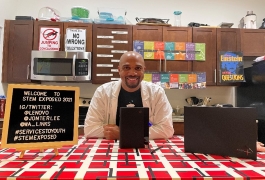Presenting Your Best Self on Social Media
Social media is pervasive in our lives. According to an April 2021 Pew Research Center survey, 84% percent of Americans between 18 and 29 use at least one social media platform. And, while you might be using your account mainly to share memes and memories, it can also have a big impact on your career.
About 70% of employers included in a survey by CareerBuilder said that they look up candidates’ social media before making hiring decisions, an increase of 10% from a similar survey the year before. “They do it in part to make sure there are no red flags,” says E. Michele Ramsey, an associate professor in communication and women’s studies at Penn State Berks.
More than half of employers reported that they have chosen not to hire an applicant based on what they found on their social accounts, including inappropriate photos, drinking and drug use, and discriminatory comments. But hiring managers also are looking for positives—how you might align with the team and contribute to the company.
You might not love the idea of a Human Resources officer scrolling through your Instagram account, but with an increasing number of employers checking, your online reputation can both help and hurt your chances of landing your dream career. Here are tips from experts on how to showcase your best self online.
Inventory your online presence
Just because employers look at your social media accounts doesn’t mean you need to wipe them out and start fresh. In fact, that’s probably the worst thing you could do. For one thing, most of your posts are probably fine—employers are looking for indications that you may cause trouble in their organization, not to judge your taste in music or movies. For another, it can look suspicious. “If a company goes in and you have nothing on your feed, it 100% is going to read as if you went and wiped everything clean,” says Ramsey, “which can communicate—whether it’s true or not—you have something hidden.”
Instead, take an inventory of your posts. “I asked my students in one of my classes to go back and do a content analysis of what I call their digital footprint, and to look at the last 50 things they posted and categorize them,” says Ramsey. “If you go back and look at your tendencies, it speaks to who you are, your values, what’s important to you.” If you have the time, Ramsey recommends going back as far as you can.
Andrew Selepak, a communications researcher at the University of Florida, recommends asking yourself: “Do these [posts] reflect the person that I’m trying to project?” If the answer is no, delete or archive the post. Don’t forget to look at the posts you are tagged in too.
If you’ve been active online for many years and can’t bear individually going through posts, some sites like Facebook now offer bulk deleting tools. There are also third-party browser extensions like Social Book Post Manager for Facebook and TweetDeleter for Twitter. But don’t delete everything! Bulk tools can help clean up older posts, but remember that totally clearing an account can appear suspicious.
One more way to check what employers can see is to type your name into a search engine. To do this, you will want to use a private browser setting like Incognito in Google Chrome so that your search results are not influenced by your browsing history. You can also try using several different browsers. However, this tip might not work if you have a very common name, says Selepak.
While you’re working through your online audit, check if you have any “dead” accounts—social media platforms you no longer post on or simply forgot about. If you do, it may be time to delete them. Dead accounts can be off-putting for employers because they suggest a lack of attention to detail, says Selepak.
Use social media for success
Although it’s good to practice caution in what you post, having a consistent presence online can boost your chances of getting hired. In the aforementioned CareerBuilder [cap] survey, 44% of employers reported that a person’s social media presence led to their hiring. Even if you have no aspirations of becoming an Instagram influencer, having some presence online is better than none at all, says Selepak. In the same CareerBuilder survey, 57% of employers said they are less likely to hire a candidate without any visible online accounts.
Whether it’s LinkedIn, Twitter, or Instagram, having a professional account with regular posts can make a difference. To start your social media reboot, create consistency in your public accounts. Selepak says it’s good to have a common handle and image across accounts and to also build a regular voice that you use to speak with your audience.
“Posting at least once a week is always a good idea,” says Ramsey. “Post one thing personal a week and then one thing connected to the industry you want to enter.” As an aspiring chemist, you can share new research and industry breakthroughs, helping yourself stay up-to-date while showing others that you’re engaged. When you share news, include a short analysis or takeaways to show potential employers that you’re capable of concise analysis and communication, says Ramsey.
Following industry and academic leaders can also help you define your career path. You can find employers that best fit your interests and values. Plus, when you find yourself in an interview, you’ll be well-acquainted with the organization’s mission and stand out as an enthusiastic candidate.
Hiring managers also want to see that you’re an individual with relationships and activities outside work, so it’s good to add a personal touch. Post photos of things like meetups with friends, your latest craft or cooking project, or other hobbies.
Private tools can be useful, but nothing online is truly private
Some sites like Facebook offer comprehensive privacy tools that control who can see which of your posts. This can help you manage your online presence if there are some accounts that you’d prefer only your family and friends see. However, hiring managers might find it off-putting if you have no online persona at all, says Selepak. So, putting all your accounts on private mode may not help you get hired.
Another thing to remember is that nothing you post online is truly private. In a private Facebook group, for example, someone can still screenshot your posts. That’s why even in intimate online settings, it’s best not to totally let loose.
Avoid posting anything that could damage your professional reputation, including controversial opinions and inappropriate images. An image of you dressed casually and sipping some wine or beer is fine, says Ramsey, “but you don’t have to post a video of you after 17 drinks and acting like a fool.”
Don’t badmouth classmates, teachers, or colleagues. Letting off steam online might feel good in the moment, but future employers probably don’t want to hire someone who openly trash-talks their team. Arguing online is also generally not worth it, adds Ramsey, and can sometimes be interpreted as bullying. More often than not, you won’t convince someone that your position is correct either.
One simple way to avoid problems down the line is to ask if you would be comfortable with an online post of yours appearing on a billboard. Because if someone else can screenshot a comment and post it publicly, that’s basically the same thing. “Don’t post anything you wouldn’t be 100% OK with being on a billboard with your name underneath it,” says Ramsey. “That, to me, is the best advice.”
Even posts you retweet or “like” can harm you. You might have a Twitter bio that reads, “RTs are not endorsements,” but that’s not how employers see it, Ramsey notes. “If you are retweeting something that’s problematic, you are amplifying something that’s problematic, and it doesn't matter if you believe it or not,” says Ramsey. “You don't want to do that sort of thing.”
And if you do want to weigh in on a more heated issue, Selepak recommends taking time to cool off and take a breath, rereading your draft post, and remembering that you don’t need to rush to share your opinion. “Don’t be posting things just because you want to get likes and retweets and be controversial, because it’s not going to get you anything except potentially fired down the road,” he says. “You can’t go into a store and pay for anything with a viral tweet.”




